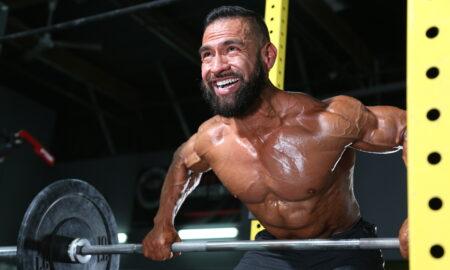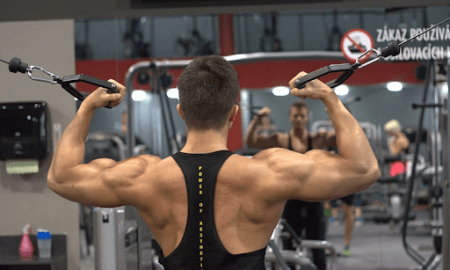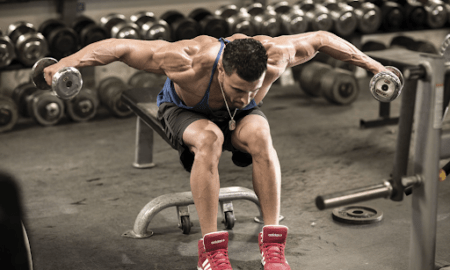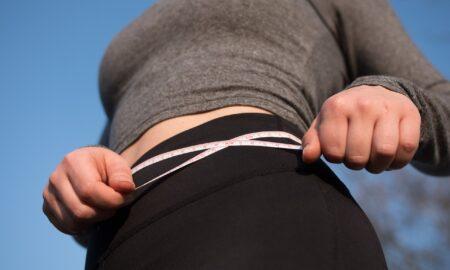Q: I started competing in 2004, and I’ve competed in multiple shows every year since then. I’m thinking about taking 2010 off, as I need to put on some muscle to be competitive on the national level. Plus, I really need to concentrate on my family and building my business. I know that you have been competing for decades. Have you ever taken a year off? What are your thoughts? By the way, you are a tremendous inspiration!
A: Okay, let me get this straight. You want to take a year off from competing, but you want me to keep at it because I inspire you? LOL and OMG! Naw—I’m just yanking your chain. I’m going to keep doing what I do because I love it and because it’s one of the few things that I’m really good at. For the past 10 years people have been asking me when I’m going to retire from competing. My answer is always the same. I’ll retire when it stops being fun. Right now I’m having a blast competing and guest-posing, so retirement isn’t even in my vocabulary (did I even spell it right?).
At age 50 in 2009, I had one of my best bodybuilding years ever. With wins at the Europa Super Show, the North Americans, the Team Universe and the IFBB Masters World Championships, along with a top-eight finish at the IFBB World Championships—closely followed by my appearance on the cover of the January ’10 IRON MAN—I couldn’t have had a better year, and neither could anyone else. Okay, Jay Cutler won the Mr. Olympia—but short of that?
Let’s get back to your question. There were two years in the past 27 in which I didn’t compete in bodybuilding. In 1989 I was finishing my master’s degree in exercise physiology at the University of Texas (Hook ’em, Horns!). I didn’t want the pressure of a competition diet while I was having to use that much brain power, so I didn’t compete. I did, however, take several guest-posing appearances and got in good enough shape that I think I could have won a second straight NPC Texas Overall Championship had I competed in that show.
I took 1991 off from competing in bodybuilding because I was going through a divorce and found myself a single father of a 2 1/2-year-old daughter. Like you, I needed to concentrate on my family at the time. I competed in a couple of powerlifting meets because the preparation isn’t nearly as time consuming as bodybuilding. I had lots of time to spend with my daughter—who’s now competing in figure.
Over the years a number of competitors I’ve worked with have taken a year off from the bodybuilding stage. Certainly family matters (at any time) and business issues—especially if you’re self-employed—take precedence over physique competition. You have to take care of your family, and you have to take care of your job or business: Those things come first. Competing in bodybuilding—or figure, fitness or bikini—is icing on the cake. To be sure, it almost defines some of us—okay, for me and many others it’s what we are, what we do and, to an extent, what we live for. In the grand scheme of things, though, competing is unimportant if you don’t take care of your family or make a living.
That said, taking a year away from competition can be bad if you do it wrong or great if you do it right. I’ve seen athletes so fired up about competing that they threw themselves into their workouts and diets with a passion that was unstoppable. When they reached a level of competition that required them to add considerable size or dramatically improve certain bodyparts in order to win, they decided to take a year or two to add the necessary muscle. Sadly, because they didn’t have a strategy—other than lifting hard—or short-term goals, they eventually started missing workouts and meals and completely fell out of the bodybuilding lifestyle. They ended up losing a great deal of hard-earned muscle and gaining quite a bit of unwanted fat—the opposite of what they set out to do.
My good friend David Nall is the perfect example of someone who’s attacked time off from competing armed with a strategy for consistently packing on mass. David is a 6’3” drug-free bodybuilder and fitness model who’s now 34 years old and who started training at age 15. Since his last competition 17 months ago David has systematically added 20 pounds of lean muscle to his frame. He tells me that he’s eaten eight to nine meals per day, taking in 400 grams of protein, 400 to 450 grams of carbs and 80 grams of fat per day—he logs it all on a spreadsheet. He trains on the basic bodybuilding exercises but changes his program every eight to 10 weeks—sooner if he hits a plateau.
My big question for David was, “How did you stay motivated to stick with your training and diet when your next contest was so far away?” His answer was very interesting and provided a great deal of insight into how he added so much natural muscle, even after so many years of training. First, he set short-term weight-gain goals. He set monthly objectives of adding two pounds of bodyweight—approximately a half pound per week—but no more than four pounds. He would set his longer-range goals—say, 10 to 12 pounds of bodyweight above where he was. When he reached that bodyweight, he’d set his next goal about 10 to 12 pounds higher, while being careful not to exceed 10 percent bodyfat.
The really cool thing was his mental approach. He said he attacked each workout as if it were the last week of his off-season diet. Every week he told himself, “I have to train like this week is my last chance to put on another half pound of muscle.” The plan has worked like a charm, and after 17 months he’s starting his contest diet (32 weeks out) with six-pack abs and quad striations—all at a bodyweight that was “fat-boy” weight for him just a few years ago.
When it comes to being superdisciplined and organized, not everyone can do what David did. What works best for me is to set short-term goals that make me hold myself publicly accountable—as with a powerlifting meet or a photo shoot. For 15 straight years I lifted in at least one powerlifting meet during my off-season.
Another great thing to do is set up periodic photo shoots during your time away from the stage. A number of the women with whom I work have used photo shoots as their short-term tool for keeping their training on track and their diets in check. Typically, photographers prefer women to be in good shape, but not ripped, for bikini, fashion and glamour photo shoots. For guys, doing workout-type shoots is a good idea. You can capture your physique with more size in some nice gym training shots—and gauge your progress as well.
My final suggestion for helping you stay focused is that you attend some of the big shows, such as IFBB pro events or NPC national-level events. I’m borrowing this one from my longtime friend (and now NPC Texas vice-chairman) Cecil Ballard. When Cecil was planning to come to a big contest to watch me compete, his training would get more intense, and he would concentrate much more on his nutrition because he knew he was going to be rubbing elbows with national-level and world-class bodybuilders. Everyone wants to look good, even when just a spectator. Plus, you get to see (and meet) other competitors who will inspire you. Attending some top-level shows will be a great motivational tool.
As I’ve often said, consistency is the secret of my success. Find ways to maintain your consistency in both training and nutrition. Find ways to consistently maintain your training intensity, and sitting out from competition for a year can dramatically improve your physique. Take care of your family and your business, but don’t let yourself lose sight of your physique goals. Be good to the iron, and the iron will be good to you.
Train hard and eat clean.
Editor’s Note: See Dave Goodin’s blog at www.IronManMagazine.com. Click on the blog selection in the top menu bar.
To contact Dave directly, send e-mail to [email protected]. IM




















You must be logged in to post a comment Login